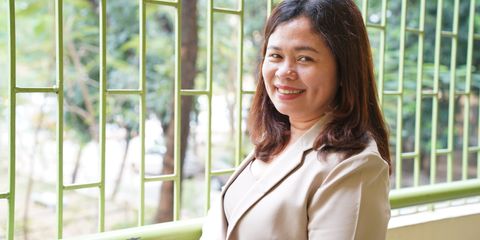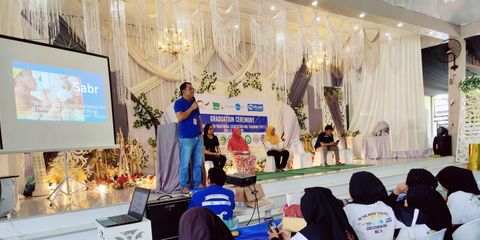22 FEBRUARY 2021
Sandra had to drop out on her first year of high school, but she did not give up on her dreams.
MAGUINDANAO, Philippines — Every child deserves to go to school; unfortunately, not everyone can afford to do so.
In fact, 9% of young Filipinos ages 6 to 24 are out of school, according to the 2017 Annual Poverty Indicators Survey.
Not long ago, Sandra was part of this statistic.
Sandra had to quit high school on her first year, “because my parents could no longer afford it,” she said in Filipino.
“My parents had five other children to support,” she explained. “My mother was not making much selling vegetables and my father could not work due to a serious illness.”
To support their family, Sandra’s mother decided to work abroad for two years. This placed the burden of care on Sandra, “While my mother was away, I had to raise my younger siblings and look after my sick father.”
The situation made Sandra’s dream of returning to school seem impossible.
However, Sandra still found a way to continue her education.
Learning beyond the classroom
Sandra enrolled herself for free in the Alternative Learning System (ALS), after a community volunteer informed her about it.
The ALS is “a parallel learning system,” which allows Filipinos who cannot access formal education to continue their education through modular and flexible means.
The program is implemented by the Department of Education (DepEd) and is facilitated by trained ALS teachers.
Under ALS, “learning can take place anytime and anyplace, depending on the convenience and availability of the learners,” according to DepEd. It can be conducted in community centers, barangay halls, homes, and similar safe spaces.
For a variety of reasons, not all young Filipinos can physically go to school on a daily basis.
Like Sandra, some have younger siblings or their own children to take care of. Some are already working, while others might be living in areas that are simply too far from schools. Meanwhile, some might not have the means to attend school — either due to financial constraints or their community’s lack of services and infrastructure to assist people with disabilities.
The ALS enables all types of learners — regardless of age — to continue learning whatever their personal circumstances might be.
At the end of the program, ALS learners must take an Accreditation and Equivalency (A&E) test. Passing the exam is as good as completing one’s primary and secondary education; hence, ALS learners must prepare well.
At 18, Sandra finished all her ALS sessions, qualifying her to take the test.
“I was looking forward to taking the exam,” Sandra shared, “But it had to be postponed due to the COVID-19 pandemic.”
This did not dampen Sandra’s spirits; instead, she spent more time reviewing.
Aside from consulting books, Sandra also took advantage of digital means of learning. “I joined an online ALS reviewer through the YES! Academy,” Sandra shared.
YES! Academy is Plan International’s online learning platform, which helps young women and young men in their journey towards youth economic empowerment.
Sandra was introduced to the YES! Academy through Plan International Philippines’ Reach Mindanao Project.
Aside from ALS reviewers, the YES! Academy also offers online modules on life skills training, and entrepreneurship.
The modules contain education videos, gamified quizzes, and interactive texts. It can be accessed for free through computers or smart phones. “The online reviewer was informative and interactive,” recalled Sandra. “It was interesting to use.”
This year, Sandra’s mother is finally returning home. “And this year, I will also begin my next journey,” said Sandra.
“I am determined to pass my A&E test,” she continued. “Afterwards, I will proceed to college and work on becoming a teacher.”
“I will advocate for ALS and inclusive education,” Sandra stressed. “I want to encourage more young women and girls to continue their studies.”
“Never forget your dreams,” she added. “Always remember that it is never too late to learn.”
The Reach Mindanao Project empowers the youth of Maguindanao through education, skills development, and community-based entrepreneurship. We encourage young women and young men to participate in local development and peace-building. The project is implemented by Plan International and is funded through the generous support of the Reach Out To Asia (ROTA) Foundation.
Categories: Education


